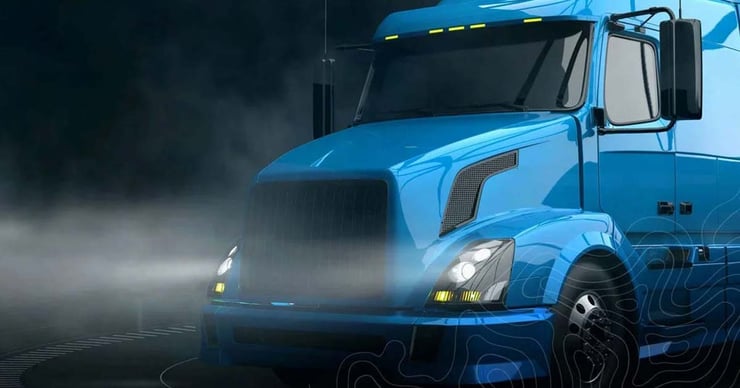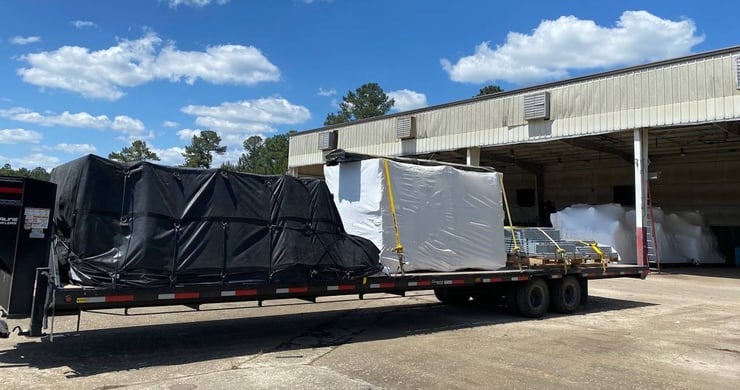
Shipping Kansas City to St Louis: Thinking Outside the Box
February 1, 2025 | Dan Boaz
This is just one more example of how our team’s creative problem-solving and extensive experience can truly make a difference for our clients. We’ve built a strong relationship with one of our regular customers who specializes in creating custom displays for retail stores. As the holiday shopping season kicked into full gear, they found themselves under tight pressure to complete a project. It was early December, and with the holiday rush already underway, they had only a few days to get everything done. They reached out to us with an urgent request: they needed a 53-foot tractor trailer to transport freight from their facility in Kansas City, Missouri, to a shopping mall in St. Louis, Missouri, where the displays would be installed.
Read More About Shipping Kansas City to St Louis: ...
Regulatory and Legislative Update - January 2025
January 15, 2025 | Hank Seaton
Contents Regulation and Enforcement FMCSA expands crash preventability review criteria FMCSA to highlight upcoming SMS changes in January 16 webinar Compliance date pushed back for certain provisions of broker/forwarder rule Trump labor pick, port dispute stance raise questions about labor policy FMCSA proposes to waive hazmat endorsements for certain limited operations Company denied exemption for limited interstate driving by younger drivers Private fleet denied lighting exemption due to inactive DOT number Autonomous vehicle firms denied exemption concerning warning devices FMCSA removes 15 devices from list of registered ELDs Legislation Multiple trucking-related bills die at the end of the 118th Congress Courts Supreme Court won’t review law allowing California to set emissions standards Advocacy and Comment Regulation and Enforcement FMCSA expands crash preventability review...
Read More About Regulatory and Legislative Update - ...
Texas Trucking Company
November 23, 2024 | Dan Boaz
Hot shot trucking companies in Texas specialize in hauling smaller, time-sensitive loads—often for the energy sector, where timing is crucial. From providing hot shot delivery services to offering competitive freight quotes, these companies are integral to the world of Texas logistics. In addition to their speed and accessibility, hotshot trucking companies in Texas offer a cost-effective alternative to larger freight services for small to mid-sized loads. By specializing in less-than-truckload (LTL) shipments, they help businesses avoid the higher costs associated with traditional carriers that might require full-truckload commitments. Many of these companies also invest in advanced tracking technology, enabling real-time monitoring and communication for clients. This focus on timely service and transparency has positioned hotshot trucking as a vital component of Texas’s logistics...
Read More About Texas Trucking Company
Regulatory and Legislative Update - November 2024
November 22, 2024 | Hank Seaton
Contents Regulation and Enforcement Trump presidency to bring big labor, environmental policy changes FMCSA regulations might not change much under Trump President Trump nominates former Rep. Sean Duffy as DOT secretary FMCSA acts on broker transparency, SMS changes in election’s aftermath FMCSA plans to postpone elements of broker/forwarder financial responsibility rule States begin mandatory CDL downgrades for clearinghouse violations Truck Leasing Task Force meeting rescheduled for December 3 Legislation Lame duck session of Congress unlikely to produce much change for trucking Courts Federal judge strikes down rule expanding overtime pay eligibility Advocacy and Comment Regulation and Enforcement Trump presidency to bring big labor, environmental policy changes The election of President Trump might not mean that much for motor carrier safety regulation in the near term, but it...
Read More About Regulatory and Legislative Update - ...
Regulatory and Legislative Update - October 2024
October 25, 2024 | Hank Seaton
Contents Legislation Speed limiters, preemption, and Norton bill await possible lame duck action DOT Funding Bill Additional States Considering California Type CARB Restrictions Regulation and Enforcement Significant FMCSA regulation is limited before the next administration FMCSA Registration Modernization Stakeholder Day III Advocacy and Comment Legislation Speed limiters, preemption, and Norton bill await possible lame duck action Although Congress technically continues to meet in October, all significant legislative action paused at the end of September until after the election. Congress is scheduled to reconvene November 12 in what is informally called a “lame duck” session. Among the big issues on the docket are continued funding of the federal government, which has been held in place through December 20 by virtue of a stopgap measure enacted by Congress and signed by President...
Read More About Regulatory and Legislative Update - ...
The Types of Vehicles Used for Emergency Freight
October 15, 2024 | Dan Boaz
When you're facing a shipping emergency, every minute counts. And you need more than just a truck – you need a solution. The right emergency freight choice ensures that your urgent cargo reaches its destination as quickly, safely, and cost-effectively as possible. Selecting the appropriate freight service depends on several key factors, including shipment size, distance, time constraints, and the nature of the cargo.
Read More About The Types of Vehicles Used for ...
How to Start a Hotshot Trucking Business
October 1, 2024 | Dan Boaz
Today we're diving deep into how to get started in hotshot trucking. If you're looking for a way to enter the trucking industry with lower startup costs and more flexibility, hotshot trucking might be the perfect fit for you. We'll walk you through the key steps to launch your hotshot trucking business, from understanding what it is to finding your first loads. We’re an expedited freight company that works with hotshot truckers all across North America. We’ve been in business since 2006, close to 20 years and have a team of experienced expeditors who have seen it all. But just so you know we don’t work with businesses that are just starting out, we only work with carriers that have been in business for 3 plus years, have a high FMCSA rating, and the best insurance - you can actually learn all about that here. But everybody has to start somewhere and we want to help you get there. Let's...
Read More About How to Start a Hotshot Trucking Business
Regulatory and Legislative Update - September 2024
September 28, 2024 | Hank Seaton
Contents Regulation and Enforcement House panel approves bill to address FMCSA’s commercial enforcement House panel advances bill granting carrier access to driver safety history Regulation and Enforcement FMCSA once again seeks input on plan to revamp online registration FMCSA seeks input by September 26 on its periodic review of guidance documents Truck Leasing Task Force to meet in October and November FMCSA removes two devices from list of registered ELDs FMCSA denies ELD exemption to owner-operator Wisconsin carriers receive exemption for alternative securement of logs Advocacy and Comment Legislation House panel approves bill to address FMCSA’s commercial enforcement The House Transportation & Infrastructure Committee on September 18 approved legislation (H.R. 8505) that addresses FMCSA’s enforcement of the commercial regulations on motor carriers, brokers, and freight forwarders....
Read More About Regulatory and Legislative Update - ...
Regulatory and Legislative Update - August 2024
August 20, 2024 | Hank Seaton
Contents Regulation and Enforcement FMCSA supports legislation to assess penalties for unlawful brokerage FMCSA Holds Final Listening Session on SFD Initiative FMCSA pushes back timing of various rulemaking proceedings DOT’s artificial intelligence head named FMCSA deputy administrator Company loses exemption bid for additional driving time FMCSA denies HOS exemption for drivers hauling cement FMCSA removes four devices from list of registered ELDs CVSA schedules Brake Safety Week for August 25-31 FMCSA allows multiple carriers to use pulse lighting systems Carriers allowed to use two camera systems instead of mirrors Legislation House DOT funding bill would block speed limiters, preemption changes Committee directs DHS to establish task force on supply chain fraud and theft Courts U.S. Supreme Court weakens executive agencies’ regulatory authority Federal judge likely to strike down...
Read More About Regulatory and Legislative Update - ...
Advantages of Dedicated Freight Services
July 21, 2024 | Dan Boaz
In the expedited freight industry, efficiency is paramount. Dedicated freight services offer a solution, promising speed, safety, and consistency. Dedicated freight services involve the allocation of specific vehicles, such as sprinter vans or tractor trailers, exclusively for a single client's cargo transport needs. Unlike traditional freight carriers, dedicated freight services provide tailored solutions that align with a client's unique requirements, ensuring safety, speed, and consistency in delivery.
Read More About Advantages of Dedicated Freight Services
Hot Shot Flatbed
June 25, 2024 | Dan Boaz
In this article we delve into the intricacies of hot shot flatbed services, exploring everything from the types of vehicles used to the role of technology in tracking and managing shipments. Our goal is to provide you with a thorough understanding of this vital service, equipping you with the knowledge to make informed decisions that enhance your operations and drive your business forward. Need a reliable flatbed solution—fast? Whether you’re searching for a “trucking company near me” for a local steel run or a nationwide flatbed truck to haul superloads across states, partner with an experienced flatbed trucking company that offers every trailer type, competitive rates, and real-time visibility from pickup to final bolt-down.
Read More About Hot Shot Flatbed
Hot Shot Trucking for the Oil Industry
June 25, 2024 | Dan Boaz
Hot shot trucking originated in the oil and gas industry. It was a response to the need for rapid transport of time-sensitive materials to remote drilling sites. Today, it plays a critical role in the logistics of the oil and gas sector. This article delves into the intricacies of hotshot trucking within the oil and gas industry. We'll explore how it provides fast freight and expedited shipping solutions, ensuring quick delivery of critical items. Whether you're a logistics manager, a trucking business owner, or simply interested in the transportation sector, this article will provide valuable insights into hot shot trucking's benefits to the oil industry.
Read More About Hot Shot Trucking for the Oil Industry
Regulatory and Legislative Update - June 2024
June 20, 2024 | Hank Seaton
Contents Regulation and Enforcement FMCSA to hold listening sessions on safety fitness procedures FMCSA outlines plan for updating registration process FMCSA to hold public meeting on fees charged for towing and recovery UCR fees to rise in 2025 after two years of decreases FMCSA rejects SBTC petition related to broker role in executing cargo claims Washington high school seeks age relief on commercial permits Company seeks exemption to allow limited interstate driving by younger drivers Oregon DOT seeks relief related to drivers from Freely Associated States AAMVA procedures for CDL system administration incorporated into FMCSRs Covenant, Landair seek relief from CDL restriction Legislation House bill would address FMCSA’s commercial regulations enforcement Advocacy and Comment Regulation and Enforcement FMCSA to hold listening sessions on safety fitness procedures FMCSA will hold...
Read More About Regulatory and Legislative Update - ....jpg?width=740&length=740&name=shutterstock_6919525%20(1).jpg)
Hot Shot Trucking Texas
June 19, 2024 | Dan Boaz
Hot shot trucking is not just a logistical solution. It is an economic imperative in Texas. Hot shot services are essential in supporting businesses across the state, from oil and gas operations to small local enterprises. Moreover, it plays a crucial role in disaster relief and emergency situations. By ensuring rapid delivery of essential supplies, hotshot trucking becomes a lifeline in times of crisis. This article aims to provide a comprehensive understanding of hot shot trucking in Texas. We will also explore the regulatory landscape, safety considerations, and the strategic integration of hot shot services into your logistics plan. Whether you're a logistics manager, a small business owner, or a supply chain consultant, this guide will equip you with the knowledge to navigate the world of hot shot trucking in Texas effectively.
Read More About Hot Shot Trucking Texas
Regulatory and Legislative Update - May 2024
May 16, 2024 | Hank Seaton
Regulatory and legislative news for May 2024 includes the FMCSA renewing consideration of knowledge/proficiency exams for carriers and brokers, the FMCSA inviting comments on its plan for a new online registration platform and Hawaii seeking exemption on student transportation options. The FMCSA is also set to revise a younger driver pilot program. Contents Regulation and Enforcement FMCSA formally drops certain conditions for younger driver pilot program Pitt Ohio’s denied relief from CDL requirement of younger driver program FMCSA to hold virtual public meeting on registration modernization Carrier receives approval for pulse lighting system Legislation House passes bill to facilitate use of G.I. Bill benefits for CDL training House passes bill to increase safety scrutiny of motor carriers transporting mail House, Senate bills would establish a crash victim advocate within DOT...
Read More About Regulatory and Legislative Update - May ...
